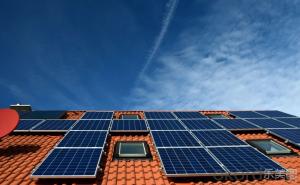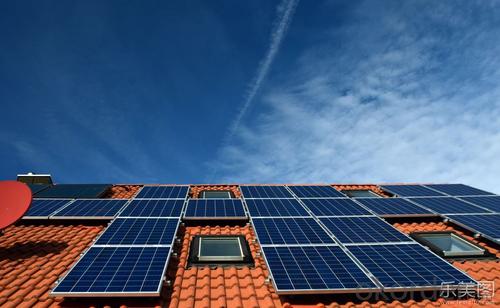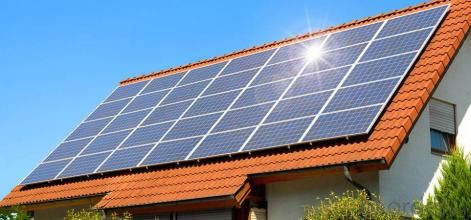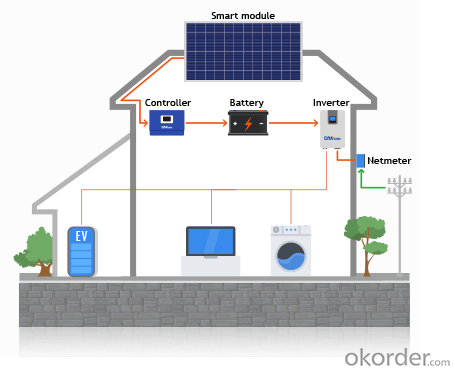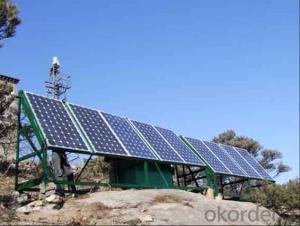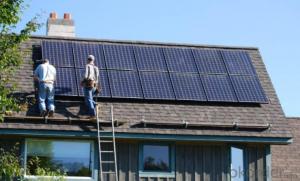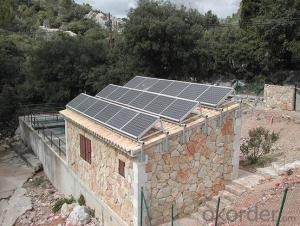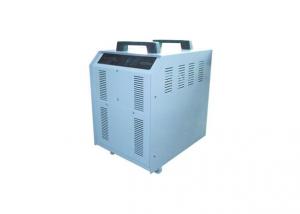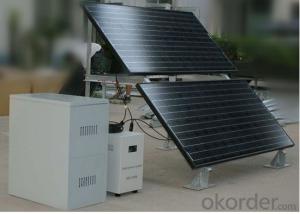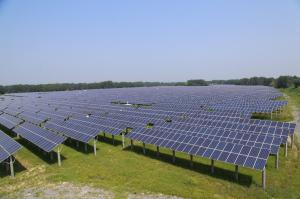10kw Solar Off-Grid Power System for Home - Solar Energy Systems Prices
- Loading Port:
- China main port
- Payment Terms:
- TT OR LC
- Min Order Qty:
- 1 set
- Supply Capability:
- 500 set/month
OKorder Service Pledge
OKorder Financial Service
You Might Also Like
Specification
1. Technical parameters of 10kw Solar off- grid Power System for home
- Solar panels
Power(Pmax): 320 Wp
Dimension: 1640x992x40 mm
Working Voltage(Voc): 39.7V
Working Current(Imp):9.32A
Weight: 20 kg
- PV Inverter with controller
Efficiency: >85%
Pure sine wave
AC 220V 50/60Hz output
Working Temp: 0℃~40℃
Battery overvoltage protection,undervoltage protection,overload protection,short circuit protection, overtemperature protection,etc.
580*290*675mm 77.5KG
-Mounting Bracket
Flat roof or Ground: Galvanized steel type;
Tile roof: Aluminium type
Wind Load Resistanc: 45m/s
Snow Load: 2kN/m2
- GEL Battery
12V180Ah
522*240*225mm 56KG
-DC Cables
PV1-F
TUV/UL certificates
2. Product images
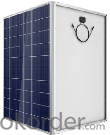
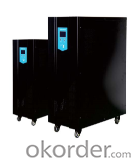



3. Product list
| No. | Item |
| 1 | Solar Panels |
| 2 | PV Inverter with controller built-in |
| 3 | Controller |
| 4 | Mounting racks |
| 5 | DC Cables |
| 6 | AC Cables |
| 7 | MC4 Connectors |
| 8 | GEL Battery |
| 9 | Combiner Box |
| 10 | Distribution box |
4. Remark
-In rainy days, the battery can support 2000W load work 24hours.
-The maximum power load should not exceed 8.5KW (including inductive load impact: such as refrigerators, air conditioners, washing machines, etc. with motor load).
-The battery can be fully charged in 5-6hours under STC sunshine condition.
- Q: Can solar energy systems be used for desalination?
- Yes, solar energy systems can be used for desalination. Solar desalination involves using solar energy to power the desalination process, typically through either solar thermal or solar photovoltaic technologies. This renewable energy source can be harnessed to heat water or generate electricity, which can then be utilized to remove salt and other impurities from seawater or brackish water, making it suitable for drinking or agricultural purposes. Solar desalination offers a sustainable and environmentally friendly solution to address water scarcity issues in regions with abundant sunlight.
- Q: Can solar energy systems be used in mining operations?
- Yes, solar energy systems can be used in mining operations. By installing solar panels and utilizing solar power, mining companies can reduce their dependence on fossil fuels and reduce greenhouse gas emissions. Solar energy can be used for various mining activities such as powering machinery, lighting, and ventilation systems, thereby providing a sustainable and cost-effective alternative to traditional energy sources.
- Q: What is the role of optimizers in a solar energy system?
- The role of optimizers in a solar energy system is to maximize the overall efficiency and performance of the system. They are electronic devices that are connected to each individual solar panel in order to monitor and optimize its output. Optimizers work by performing a range of functions. Firstly, they ensure that each solar panel operates at its maximum power point (MPP), which is the point at which it generates the most power. By continuously tracking and adjusting the voltage and current of each panel, optimizers ensure that they are always operating at their MPP, even in situations where shading or other factors may cause some panels to underperform. In addition, optimizers also provide module-level monitoring and diagnostics. They collect data on the performance of each individual panel, including its voltage, current, and temperature. This information is transmitted to a central monitoring system, which allows for the detection and troubleshooting of any issues or malfunctions in real-time. This level of granularity and visibility into the performance of each panel helps to improve maintenance and overall system reliability. Furthermore, optimizers also enhance the safety of the solar energy system. They include built-in safety features such as rapid shutdown capabilities, which enable the system to quickly and safely shut down in the event of an emergency or maintenance requirement. This helps to protect both the system and the individuals working on it. Overall, the role of optimizers in a solar energy system is crucial for maximizing energy production, improving overall system efficiency, ensuring safety, and facilitating effective monitoring and maintenance. By optimizing the performance of each individual solar panel, optimizers contribute to the overall success and viability of solar energy systems.
- Q: Are there any maintenance costs associated with solar energy systems?
- Yes, there are maintenance costs associated with solar energy systems. While solar panels require very little maintenance compared to other energy systems, there are still some costs involved. These costs include regular cleaning of the panels to ensure maximum efficiency, inspection and repair of any damaged or malfunctioning components, and periodic replacement of parts that may wear out over time. Additionally, solar energy systems may require monitoring and maintenance of the batteries or inverters that store and convert the energy. It is also recommended to have a professional conduct an annual inspection to ensure the system is functioning properly. While these maintenance costs are typically low compared to the savings generated by solar energy, it is important to factor them into the overall cost analysis when considering the installation of a solar energy system.
- Q: What are the different incentives available for installing solar energy systems?
- There are several incentives available for installing solar energy systems. These include federal tax credits, state and local incentives, net metering programs, solar renewable energy certificates, and grants or loans for renewable energy projects. These incentives help to reduce the upfront costs of installing solar panels and make solar energy more affordable for homeowners and businesses.
- Q: Can a solar energy system be installed on a warehouse or industrial facility?
- Yes, a solar energy system can be installed on a warehouse or industrial facility. In fact, these types of buildings often have large roof spaces or open areas that are ideal for installing solar panels. This can help the facility reduce its dependence on traditional energy sources, lower electricity costs, and contribute to a more sustainable and environmentally friendly operation.
- Q: What is the difference between on-grid and off-grid solar energy systems?
- The main difference between on-grid and off-grid solar energy systems lies in their connection to the utility grid. On-grid systems are connected to the electric grid, allowing for the seamless exchange of energy between the solar system and the grid. This means that excess electricity generated by the solar panels can be sent back to the grid, while electricity can also be drawn from the grid when solar production is low. Off-grid systems, on the other hand, are not connected to the grid and operate independently. They typically rely on batteries to store excess energy for use during periods of low solar production. Off-grid systems are commonly used in remote areas where grid connection is not available or in situations where individuals prefer to be self-sufficient and not rely on the grid.
- Q: Are there any risks of theft or vandalism with solar energy systems?
- Solar energy systems do come with some risks of theft or vandalism. Valuable solar panels and equipment used in these systems can attract thieves who may try to sell them on the black market. Moreover, since solar energy systems are usually installed in remote or isolated areas, they are more susceptible to theft as they may not be easily monitored. Vandalism is also a concern as solar panels can be intentionally damaged or destroyed by individuals with a grudge against the owner or simply for the sake of causing damage. This can result in financial loss and disruption of energy production. To mitigate these risks, homeowners and businesses can take various precautions. Installing security measures like surveillance cameras, motion sensors, or alarms can deter theft or vandalism. Placing panels in visible and easily accessible locations can also make them less appealing to potential thieves. Additionally, marking the panels with unique identifiers can make it harder for thieves to sell them. Insurance coverage is another crucial consideration to safeguard against theft or vandalism. Many insurance companies offer specialized policies that cover solar energy systems, providing compensation in case of theft or damage. In summary, although there are risks of theft or vandalism associated with solar energy systems, these risks can be minimized through preventive measures and insurance coverage. It is important for owners of solar energy systems to be aware of these risks and take appropriate steps to safeguard their investment.
- Q: Can solar energy systems be used for heating and cooling a home?
- Yes, solar energy systems can be used for heating and cooling a home. Solar thermal systems can be installed to heat water for space heating and domestic hot water. Additionally, solar-powered air conditioning systems, such as solar-powered heat pumps, can be used to cool a home efficiently.
- Q: Can a solar energy system be installed on a metal roof?
- Yes, a solar energy system can be installed on a metal roof. In fact, metal roofs are often considered ideal for solar panel installations due to their durability, ease of installation, and compatibility with mounting systems. The metal roof provides a sturdy and secure foundation for the solar panels, allowing for a reliable and long-lasting solar energy system.
Send your message to us
10kw Solar Off-Grid Power System for Home - Solar Energy Systems Prices
- Loading Port:
- China main port
- Payment Terms:
- TT OR LC
- Min Order Qty:
- 1 set
- Supply Capability:
- 500 set/month
OKorder Service Pledge
OKorder Financial Service
Similar products
Hot products
Hot Searches
Related keywords
